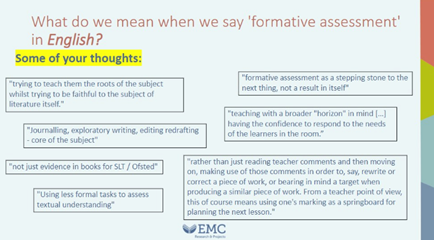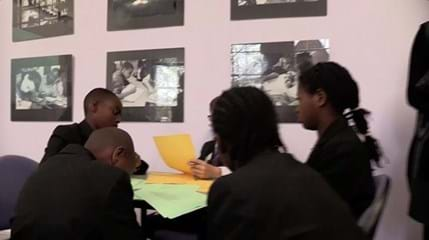This year’s Forward/emagazine poetry competition for A Level students was a joy for those of us doing the judging! We decided for the first time this year to only offer a ‘creative critical’ response, abandoning the purely critical writing of past years. This came about because of what we saw in the entries from last year, where the creative critical work was of a significantly higher standard than the critical writing. Students who wrote a poem inspired by one of the Forward shortlisted poems ended up writing much better critical writing in their commentary than those who took a purely analytical approach.
In this year’s competition we had over 100 entries, from schools and colleges up and down the country – comprehensives, grammar schools, independent schools, academies, sixth form colleges and FE colleges. There were multiple entries from schools but also many single students entered, clearly having been told about the competition and been encouraged to take part. One disappointment was the small number of boys sending in work – only 14 in total – but other than that it was a very full and varied entry.
The general standard of the poems written by the students, and the associated critical writing, was superb, far and away the best overall group of entries we have seen in the thirteen years since we started running a competition shadowing a major poetry prize (initially for the TS Eliot Prize and now for the Forward Prize).
The way that the students responded offers some strong pointers as to what English teachers might consider doing in the teaching of poetry (and literature more generally), to enable responses such as these.
What made this year’s entries so very different?
- Very few students, as compared with previous years, simply seemed to be following a formula, or think of themselves as doing an A Level style ‘task’, with an imagined examiner figure hovering around, looking over their shoulder. Their entries weren’t ‘tainted’ by feeling that they had to prove something to someone, without it necessarily being something they really thought or felt.
- The writing was highly committed. Students said boldly what they especially liked about their chosen poem and, in most instances, got to the heart of some significant and valid ideas that we as judges were able to recognise and agree with.
- Students concentrated on significant things, rather than getting lost in the analysis of tiny details for their own sake – though many students did use detail very well, to explain and explore the bigger ideas that they were raising.
- Much of the writing sustained a line of thought and developed it, with students choosing their own ground and then following through with a serious attempt to both explain and justify it.
- The writing felt fresh. No two poems, no two pieces of critical writing looked the same, even from schools where several students entered.
- Though it’s hard to define or fully explain, there was a quality of ‘genuine’ pleasure and involvement both in the reading and the writing of the poetry. Students’ own poems often took important ideas or experiences in their own lives and drew inspiration from the published poem to shape these. The two poems spoke to each other in surprising and inventive ways, and then the students were able to articulate points of connection and difference that were observable and obvious in their poems.
- The poems themselves were, in many cases, extraordinarily good. Students took many different approaches – sometimes taking a similar theme and writing about it in their own way, sometimes being attracted to the highly individual form of the poem and pouring their own ideas into a similar structure, sometimes a bit of both. The original poems were a genuine ‘spark’ for their own writing. There were several students who didn’t win, weren’t shortlisted and didn’t get a commendation who nevertheless showed impressive understanding of form and language, and were able to shape their thoughts and feelings into very successful poems. We could have shortlisted many more students than we finally did!
The implications of this seem to us to be profound. What we are discovering suggests that we should be teaching the analysis of poetry (and other texts too) in very different ways. It’s something we have believed for a long time but this evidence makes it all the more convincing.
- The entries show the value of students writing themselves, as a way of understanding how texts work and how other writers make choices. Students should have plenty of opportunities to do this.
- An element of choice – writing about a poem that has ‘spoken’ to them above others – seems to provoke a more committed and engaged kind of writing. We should offer students more choice in the study of texts.
- The literary critical ‘essay’, written for examination purposes, isn’t the only legitimate vehicle for the serious development of literary critical thinking. In the academy, English experts like Professors Ben Knights, Chris Thurgar-Dawson, Rob Pope, Lucy Newlyn, Thomas Karshan, poet Sarah Howe and others have long advocated creative criticality as a legitimate form of critical response. We should be offering students a wider range of genres and formats for literary critical thinking.
The winning writing is here, along with that of the two runners-up. But we also thought it worth quoting extracts from a couple of those students who weren’t winners but who wrote really, really well, to give a sense of the quality of the entry as a whole.
The question Kaminsky’s poem seems to raise is the responsibility of ordinary people to stop catastrophic events on a national or global scale. Do we even have that power? If so, much guilt ought we to feel? The fractured structure and enjambement Kaminsky employs lends itself to the sense of fractured priorities and mindsets; we want to change the world but it’s so much easier to lie in bed or watch the sun, even as others suffer. […] I hoped to emulate this fractured structure in my own poem: feeling tiny and insignificant against huge, global problems, while the daily issues of domestic life can take on monolithic proportions.
Lyra Christie, Gosforth Academy (‘We lived happily during the war’)
Something else that impressed me was that although the poem accurately depicts the bleakness of watching a family member die, its imagery remains rich and beautiful throughout. The ordinary is made fantastical; the hospital’s ICUs become a chorus, the drive home purple and ice-glazed. Paradoxically, I found this to reinforce the mundanity of loss. The speaker tries to find something profound in their hardships, and beauty in their Mother’s final days. Whilst at first glance the poem can come across as rather dispassionate, repeat readings reveal its warmth. At is bare bones, it seems like an attempt, after the fact, to mythologise a loved one’s death – although the grim reality of things sometimes slipped through.
Em Power, Esher College (‘Donut secret 2’)




